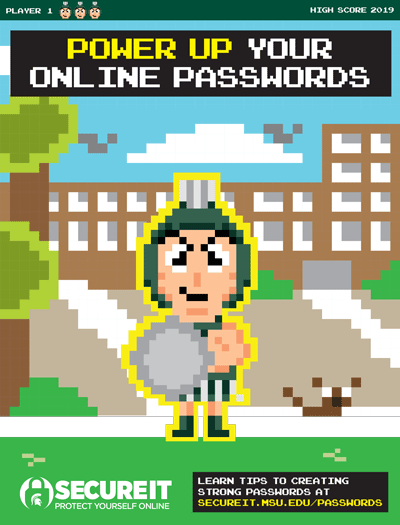Passwords
Protect your NetID and password combination. Don't use your MSU NetID and password for social media, retail, or any non-MSU sites.
Reputable organizations will NEVER ask for your account and password combination in an email message.
To know...
Secure passwords are very important.
- Use a minimum of 15 characters that include at least one upper case letter, one lowercase letter, and one number.
- Use special characters like # ^ * - _ ! = [ ] { } | \ : ' , . ? / ` " ( )
- Don't use @ $ & ~ ; < > %
- Don't start your password with a character other than a letter or number.
- Don't include your name (first, middle, or last) as part of a longer password (i.e., Sparty2028 wouldn't work as a password if your name were Art).
- Don't reuse a password you've used before.
- Don't use words from the dictionary or words with numbers added to the end as your password.
- Don't use double words (i.e., SpartanSpartan), letter substitutions (i.e., Sp*rt*n), or common sequences (i.e., asdfg, 12345).
- Don't share your passwords with anyone, including your parents or roommates.
Use a passphrase to make your password stronger.
- A passphrase is different from a password in that it typically contains 20 or more characters and may contain spaces as part of a phrase or full sentence. A passphrase will be stronger than shorter passwords.
- To create a passphrase, choose a sentence that is long and easy to remember.
- In your passphrase, include proper nouns, numbers, and punctuation.
MSU will never ask you for your NetID and password combo in an email or text message.
Phishing attempts are online scams involving email and text messages appearing to be from a trusted source that ask for personal information, often including passwords.

